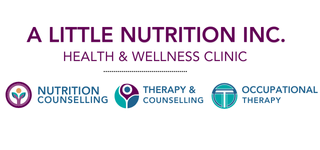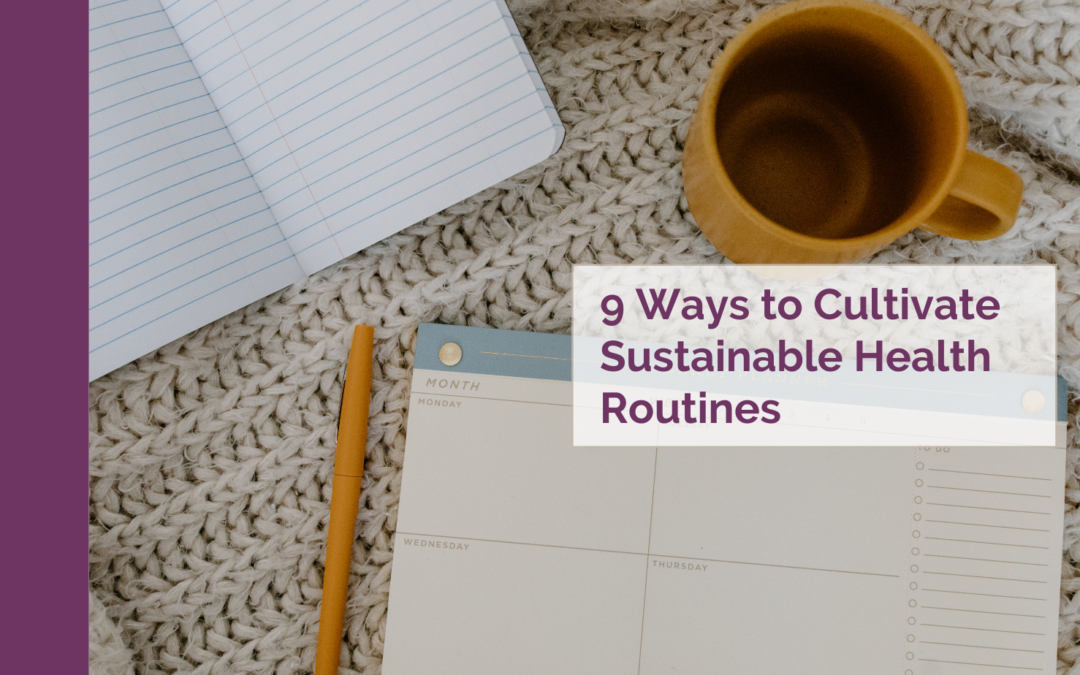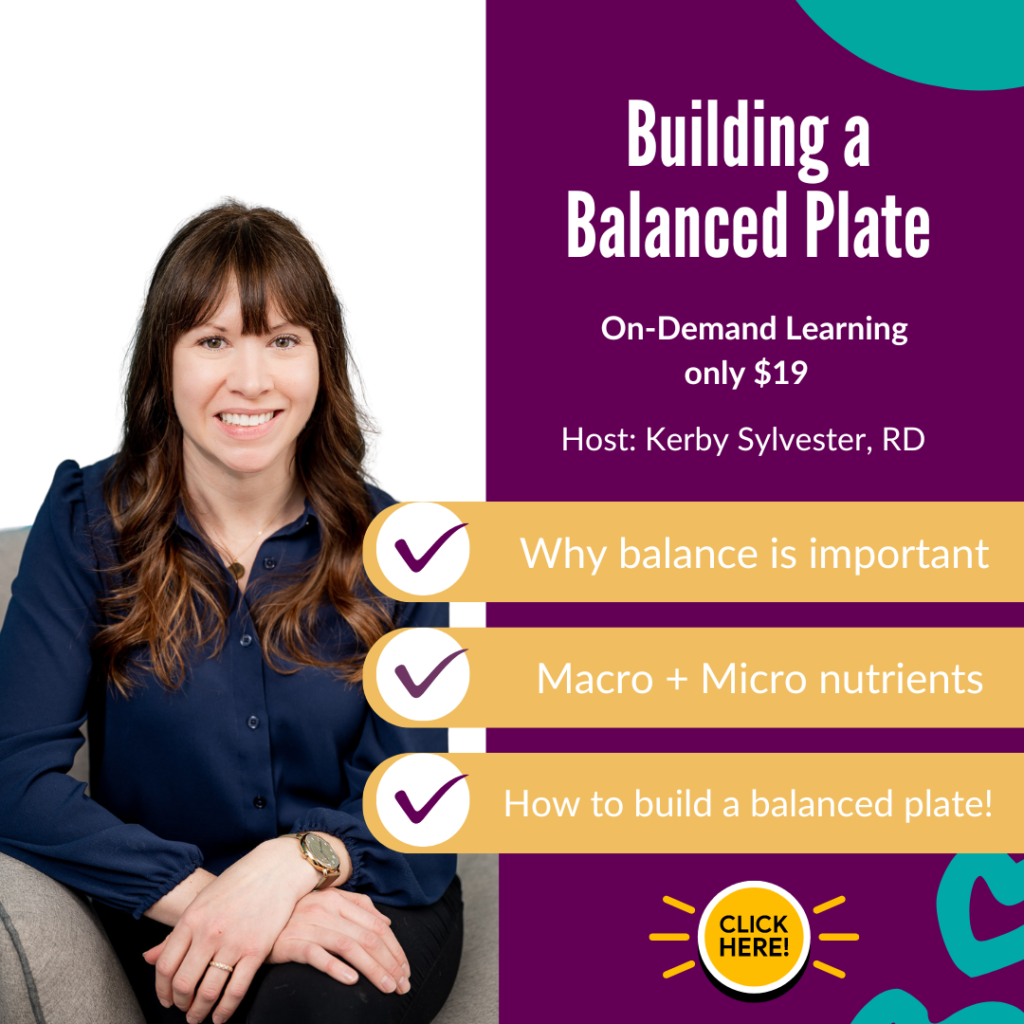Sustainable health routines are the key to improving your overall well-being without falling into rigid or restrictive patterns. Instead of chasing quick fixes, focusing on progressive, adaptable changes creates a foundation for long-term health. These self-care routines aim to prioritize taking care of yourself in ways that feel good, align with your individual needs, and create balance in your life.
Whether you’re looking to improve your relationship with movement, make nourishing food choices, or redefine what health means to you, this guide outlines nine compassionate and practical strategies to help you focus on sustainable health routines.
1. Prioritize Health Over Numbers
Forget the focus on weight or calorie counts. Instead, focus on how your daily choices enhance your overall health and well-being.
How to Do It:
Celebrate Non-Scale Wins
Improved energy, better sleep, increased strength, mental clarity, and reduced stress are all signs of well-being that have nothing to do with weight.
Build Habits That Feel Good
Focus on actions that improve your daily life, such as walking for relaxation, preparing meals that satisfy you, or prioritizing rest and recovery.
Respect Your Body’s Individual Needs
Health isn’t one-size-fits-all. Everyone has different nutritional, movement, and self-care needs—what works for someone else may not be what your body needs.
Reconnect with Your Body’s Internal Cues
Instead of relying on external measurements like calorie counts or step goals, tune in to your body’s signals. Ask yourself: How do I feel after eating? How does movement impact my energy? What habits support my mental and physical well-being?
Recognize That Health Is Multifaceted
Health is more than physical—it includes emotional, mental, and social well-being. Prioritizing stress reduction, meaningful relationships, and self-care are just as important as nutrition and movement.
Embrace a Long-Term Mindset
Sustainable health is about what you do most of the time, not a single meal or workout. Small, consistent actions over time have a greater impact than short-term, numbers-based goals.
2. Add Rather Than Restrict
Sustainable routines allow room for all foods. The goal? Adding nourishing options, not depriving yourself.
How to Do It:
Include More Nutrient-Dense Foods Without Elimination
Instead of focusing on what to cut out, think about what you can add. Incorporate colorful fruits, fiber-rich vegetables, satisfying proteins, and energizing whole grains to support your body.
Enhance Your Meals for Satisfaction
Meals should be enjoyable and fulfilling. Pairing flavors, textures, and nutrients (like protein with carbs and fats) can help sustain energy and keep you satisfied longer.
Reduce the “Forbidden Food” Mentality
When foods are labeled as “bad” or “off-limits,” they often become more appealing, leading to feelings of guilt or overconsumption. Instead, allow space for all foods in a way that feels balanced and enjoyable.
Think of Food as Abundance, Not Scarcity
Instead of saying, “I shouldn’t eat this,” try reframing it as, What can I add to my meal to make it even more satisfying and nourishing?
Give Yourself Permission to Eat for Enjoyment
Food is more than just fuel—it’s also about pleasure, connection, and tradition. Including all foods in a way that aligns with your preferences and lifestyle creates a more positive relationship with eating.
Adapt to Your Unique Needs
Your food choices should fit your body, lifestyle, and cultural preferences—not rigid rules. What works for someone else might not be what feels best for you, and that’s okay.
3. Say Goodbye to All-or-Nothing Thinking
Rigid, black-and-white thinking around food and movement can lead to stress, guilt, and burnout. Sustainable health routines are flexible, and adaptable, and allow for real-life ups and downs.
How to Do It:
Seek Consistency, Not Perfection
Sustainable habits are about what you do most of the time, not about following strict rules. A balanced approach allows for both nourishing meals and enjoyable treats without labeling them as “good” or “bad.”
Embrace Progress Over Perfection
Every step toward self-care is valuable, even if it doesn’t look “perfect.” If you miss a workout or eat differently than planned, it doesn’t undo all of your progress.
Use Gentle Nutrition Principles Without Rigidity
Nutrition should be a tool for well-being, not a strict rulebook. Focus on what makes you feel good, rather than following rigid guidelines that ignore your body’s needs.
Give Yourself Grace on Challenging Days
Some days, you might have more energy to cook a balanced meal, while other days, a frozen meal or takeout is the best option—and both are okay. Flexibility is key to long-term sustainability.
Recognize That Health is More Than Just Food and Exercise
Your overall well-being is influenced by sleep, stress management, connection, and self-care. Focusing too much on one aspect while ignoring others can lead to imbalance.
Reframe Setbacks as Learning Opportunities
Instead of seeing a missed workout or a change in routine as a failure, view it as feedback. Ask yourself, What can I learn from this? How can I adjust to support my needs moving forward?
4. Focus on Joyful Movement
Try to view the movement as self-care, not punishment, and try to make it an enjoyable part of your routine.
How to Do It:
Find What Feels Good for You
There’s no “right” or “wrong” way to move your body. Joyful movement can look different for everyone, and it doesn’t have to be high-intensity or structured to be beneficial.
Ditch the “No Pain, No Gain” Mentality
Movement doesn’t have to be exhausting or uncomfortable to “count.” Gentle, restorative, and low-impact activities like yoga, stretching, or walking are just as valuable as intense workouts.
Honor Your Body’s Changing Needs
Some days, movement might feel energizing, while other days, rest is what your body needs. Listening to your body and adapting accordingly is an important part of a sustainable routine.
Embrace Movement in Any Form
If traditional workouts don’t appeal to you, explore other ways to move—gardening, playing with kids, dancing in your living room, or engaging in cultural or community-based activities all count.
Let Go of Movement as a Means to “Earn” or “Burn” Food
Exercise is not a transaction—it’s a way to care for yourself physically, mentally, and emotionally. Shift the focus from calorie-burning to how movement makes you feel (energized, strong, calm, or empowered).
Adapt Movement to Your Abilities
Everyone’s body moves differently, and that’s okay. Chair exercises, seated yoga, stretching, and water-based movement are excellent options for those with mobility limitations. Finding what feels accessible and enjoyable to you is what matters most.
5. Practice tuning inwardly
Tune into Your Body’s Cues
Check in with your hunger and fullness signals before, during, and after meals. Remember, these cues vary daily, and that’s normal! There’s no “right” way to experience hunger or fullness.
Engage Your Senses for Satisfaction
Notice the colors, textures, flavors, and aromas of your food. Eating should be enjoyable—allowing yourself to fully experience a meal can enhance satisfaction and reduce the urge to overeat or restrict later.
Honor Different Eating Experiences
Not everyone has the privilege to eat slowly or distraction-free. If your meals are often rushed or eaten on the go, practicing small moments of awareness—like taking one deep breath before eating—can still foster connection with your food.
Release the Pressure to “Eat Perfectly”
Mindful eating isn’t about controlling your intake—it’s about curiosity and flexibility. Some days you might eat past fullness, and some days you might not eat enough, and that’s okay. Trust that your body will guide you over time.
Give Yourself Permission to Enjoy All Foods
Every food has value—whether it provides nourishment, comfort, or cultural significance. Instead of labeling foods as “good” or “bad,” focus on how they make you feel and what they add to your experience.
6. Set Realistic and Flexible Intentions
Extreme changes often fail. Focus on small, personal goals that evolve with your lifestyle.
How to Do It:
Celebrate Effort, Not Just Outcomes
Instead of measuring success by results alone, acknowledge your commitment to self-care, whether that’s drinking more water, prioritizing sleep, or checking in with your emotions.
Allow for Life’s Ups and Downs
Some days you’ll feel motivated, and other days will be harder. That’s okay! Progress is never linear, and adjusting your habits to fit your current circumstances is part of a sustainable approach.
Honor Your Individual Circumstances
Your health routines should work for you, not the other way around. Some days you might have the time and energy for movement and home-cooked meals, while other days, rest and convenience foods are the best choice—and that’s valid.
Let Go of “All-or-Nothing” Thinking Around Goals
If you set a goal and need to adjust it, that’s not failure—it’s flexibility. For example, if you planned to go for a 30-minute walk but only had time for 5 minutes, it still counts.
Define Success on Your Own Terms
Your goals don’t need to match anyone else’s. Whether your priority is reducing stress, finding more joy in movement, or simply feeling more at ease in your daily routine, your version of success is valid and enough.
7. Consider Emotional Health
Sustainable healthy routines go beyond food and exercise by nurturing your mental well-being.
How to Do It:
Acknowledge the Emotional Side of Eating
Food is more than just fuel—it’s also comfort, culture, tradition, and connection. Recognizing the emotional aspects of eating can help reduce guilt and encourage a more balanced, compassionate relationship with food.
Practice Self-Compassion During Difficult Moments
Struggling with emotional eating, motivation, or stress doesn’t mean you’ve failed. Instead of self-criticism, try asking yourself: What do I need right now? How can I support myself with kindness?
Normalize Emotional Eating as One of Many Coping Tools
Eating for comfort is a valid and understandable response to emotions. Rather than viewing it as a problem to “fix,” consider adding other supportive coping tools, like movement, deep breathing, or creative outlets, to expand your options.
Recognize That Emotional Well-Being Looks Different for Everyone
For some, emotional health might mean managing anxiety or depression, while for others, it could be about reducing stress or improving work-life balance. There’s no single way to prioritize mental health, and every effort matters.
Release the Expectation to “Always Feel Good”
Sustainable health includes making space for difficult emotions. Feeling sad, overwhelmed, or anxious sometimes doesn’t mean you’re doing something wrong—it means you’re human. Learning to navigate those feelings with self-compassion is a powerful part of emotional health.
Seek Support When Needed
Emotional health is just as important as physical health. Whether through therapy, support groups, or simply talking to a trusted friend, having a support system can help you navigate challenges.
8. Build a Supportive Environment
Your surroundings play a key role in forming routines that stick.
How to Do It:
Surround Yourself with Positive Influences
Follow social media accounts that support body respect, intuitive eating, and joyful movement. Unfollow or mute content that reinforces diet culture, weight stigma, or unrealistic health ideals.
Set Boundaries Around Harmful Conversations
If friends, family, or coworkers frequently discuss dieting or body changes, consider redirecting the conversation or kindly letting them know that those topics don’t align with your values.
Recognize That Support Looks Different for Everyone
A supportive environment might mean having access to fresh ingredients, but it could also mean finding affordable, convenient meal options. It could be a home gym setup or simply having comfortable shoes for walking. Support should be tailored to your needs and resources.
Find Community That Aligns with Your Goals
Whether it’s a virtual support group, a local fitness class, or a friend who shares your values, connecting with others who respect your approach to health can make your journey feel less isolating.
Give Yourself Permission to Change Your Environment as Needed
Your needs will evolve over time, and so can your surroundings. What feels supportive today may shift in the future, and allowing yourself to adapt will help you sustain long-term well-being.
9. Practice Self-Kindness
Your health is a lifelong journey, not a quick path to perfection.
How to Do It:
Speak to Yourself with the Same Kindness You Show Others
If you wouldn’t criticize a friend for skipping a workout or eating a convenience meal, extend that same grace to yourself. Self-talk matters—replace self-judgment with words of encouragement.
Recognize That Every Effort Counts
Small steps toward self-care are still valuable. Some days, prioritizing hydration, getting outside for fresh air, or simply taking a break is enough. Progress isn’t measured in perfection but in consistently showing up for yourself in whatever way you can.
Give Yourself Permission to Rest
You don’t have to earn rest. Pushing through exhaustion or burnout doesn’t lead to better health—listening to your body’s need for recovery is just as important as movement and nourishment.
Release the Expectation to “Do It All”
Life is unpredictable, and no one follows health routines perfectly. Missing a habit doesn’t mean you’ve failed—it means you’re human. Sustainable health is about flexibility, not rigid consistency.
Celebrate Your Body for What It Does, Not Just How It Looks
Your body carries you through life, allowing you to connect with others, experience joy, and engage in meaningful activities. Focusing on gratitude for what your body allows you to do can shift the focus from appearance to appreciation.
Redefine Success Through a Lens of Self-Compassion
Success isn’t about following an idealized routine—it’s about feeling good in your body and mind. What “healthy” looks like will be different for everyone, and embracing that individuality is key to a sustainable, fulfilling approach to self-care.
Building sustainable health routines isn’t about rigid rules or eliminating the foods and activities you enjoy—it’s about creating routines that support your well-being in a way that feels good, realistic, and adaptable.
Start by focusing on small, consistent actions that bring value to your life, adjusting as needed to honor your evolving needs and circumstances. Prioritize flexibility, balance, and self-compassion—these are the true foundations of long-term well-being.
Your journey is uniquely yours, and there’s no one-size-fits-all approach. Celebrate the choices that help you feel nourished, energized, and supported in ways that work for you. Every step you take toward caring for yourself—no matter how small—is meaningful.
Ready to take the next step? Choose one routine to focus on today and build from there. Your version of sustainable health starts with what feels right for you. 💛

Learn More
- How Childhood Experiences Shape Our Relationship with Food
- Understanding Your Hunger Cues and Intuitive Eating
- Navigating Toxic Diet Culture Conversations at Work






